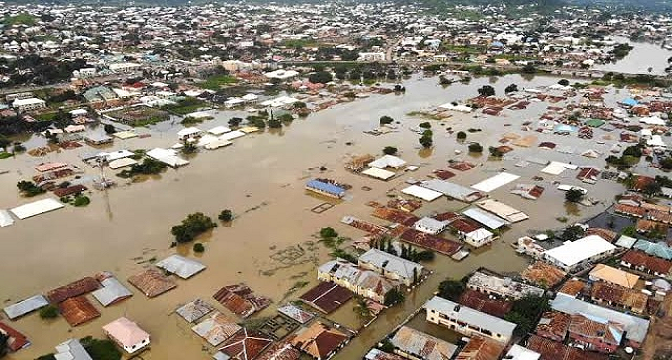Flooding in Mokwa Linked to Rainfall and Ignored Warnings, Not Dam Spills

The Nigerian Minister of Water Resources and Sanitation, Joseph Utsev, has clarified that recent flooding and loss of life in Mokwa, Niger State, were not caused by water releases from the Kainji or Jebba Dams.
Speaking at a media briefing in Abuja on Tuesday, Mr. Utsev stated that the disaster was triggered by heavy rainfall and residents' failure to heed flood warnings. He underscored that both dams remain structurally sound and pose no threat to downstream communities.
The minister extended the federal government's condolences to Niger State's government and affected residents, while praising the swift response of state authorities, local leaders, and emergency workers in delivering aid to victims.
Utsev explained that the flooding was caused by extreme weather conditions resulting from climate change, which overwhelmed the local drainage systems.
He pointed out that unregulated building and construction activities had obstructed an ephemeral tributary of River Dingi, a minor watercourse that only flows during periods of rainfall and is a tributary of the River Niger.
The absence of efficient alternative channels to redirect the excess water significantly worsened the flood's impact on the affected communities.
The minister recalled that the Nigeria Hydrological Services Agency (NIHSA), under the Federal Ministry of Water Resources and Sanitation, had issued the 2025 Annual Flood Outlook (AFO) on 10 April 2025, which predicted flooding in 19 Local Government Areas in Niger State, including Mokwa.
Citing the same report, he said 1,249 communities in 176 local government areas across 33 states and the Federal Capital Territory fall within High Flood Risk Areas, while 2,187 communities in 293 LGAs across 31 states and the FCT are classified under Moderate Flood Risk Areas.
States listed under the High Risk category include Abia, Adamawa, Akwa Ibom, Anambra, Bauchi, Bayelsa, Benue, Borno, Cross River, Delta, Ebonyi, Edo, FCT, Gombe, Imo, Jigawa, Kebbi, Kogi, Kwara, Lagos, Nasarawa, Niger, Ogun, Ondo, Osun, Oyo, Rivers, Sokoto, Taraba, Yobe, and Zamfara.
Utsev used the occasion to reiterate key warnings and recommendations from the 2025 AFO, urging states and local governments to strengthen drainage infrastructure, relocate vulnerable communities, sustain public awareness campaigns, and enforce land-use regulations to prevent encroachment into flood-prone areas.
Cloud Tag: What's trending
Click on a word/phrase to read more about it.
Abubakar Baba Kayode Zubair Aso Ofi Kwara 2023 Garba Idris Ajia AbdulQowiy Olododo Segun Olawoyin Dan Iya Kwara Teaching Service Commission 11th Galadima International Aviation College Halidu Danbaba ER-KANG Mining Nigeria Company Limited Kawu Baraje Bayer AG Magaji Nda Mahmud Ayinla Giwa Ahmed Dankaya Waheed Ibrahim Oba Abdulrahim Saheed Popoola Dunmade Olofa Of Offa Abdul-Rasheed Na\'Allah Garba Ayodele Wahab Lateef Fagbemi Elections Kola Adesina Pakata Patriots Oyin-Zubair Mike Omotosho Abdulrahman Abdulrasak Idris Garba Bashiru Makama Moshood Mustapha Isiaka Oniwa Hameed Oladipupo Ali Binta Sulyman David Oyerinola Adedunmoye Abdulkareem Alabi General Tunde Idiagbon International Airport Ilorin Ahmad Uthman Olatinwo Kayode Issa Kwara United Mary Kemi Adeosun Ayinde Oki Oyawoye Busari Alabi Alausa Ibrahim Jawondo Yusuf Lanre Badmus Malete Ayekale Soffiyyallah Kamaldeen Yoruba Offa Sam Onile Kwara Apc Lithium Kassim Babamale Balikis Jawondo Valsolar Consultoria Baba Issa Awoye Saadatu Modibbo-Kawu Muhammed Akanbi National Pilot Khadijat Ayoola Yusuf Aishatu Ahmed Gobir Ilorin East Ogbondoroko Kudirat Arinola Lawal Yusuf Ibitokun Sherifat Olusola Saraki Ilorin Emirate Ilorin Metro Park Maryam Ado Bayero Just Law Forum


